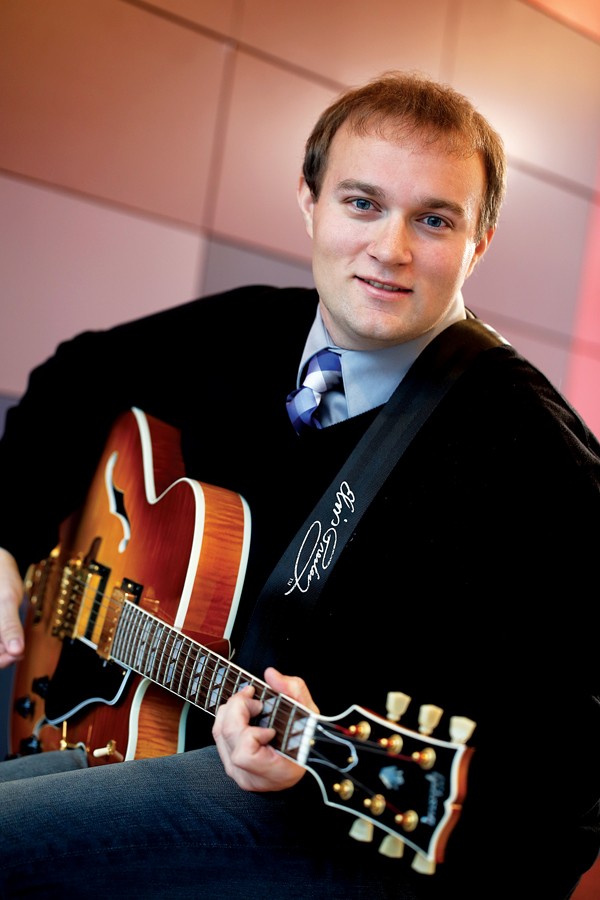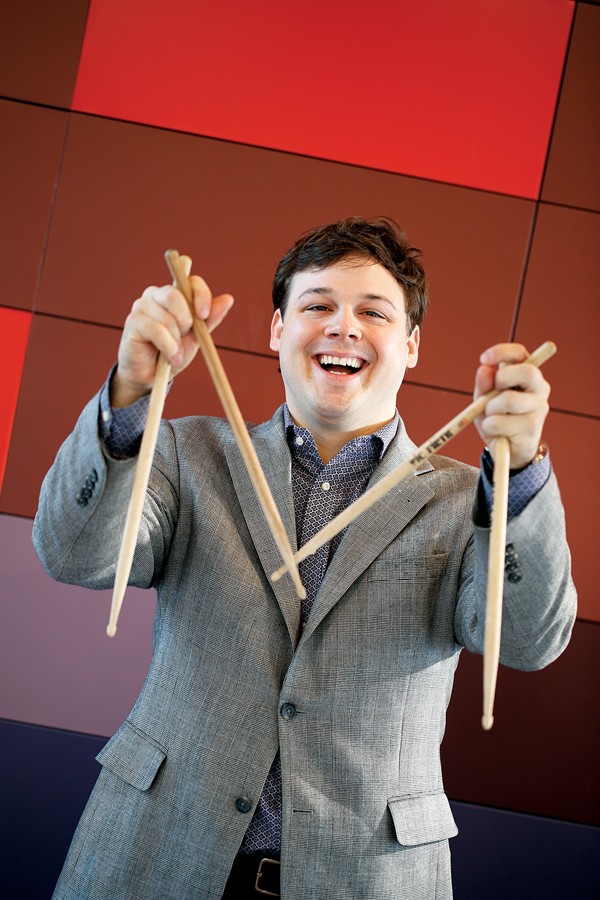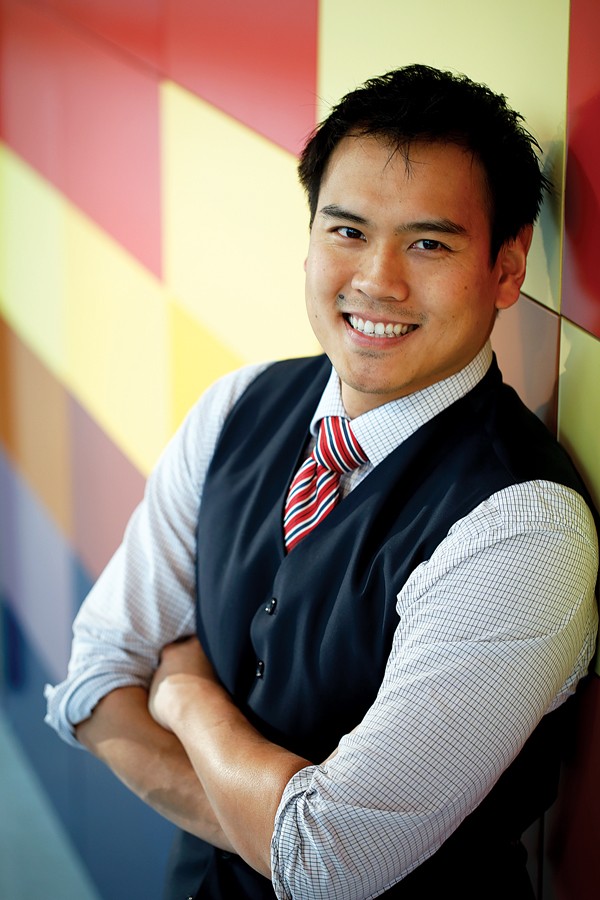Special “thank you” to Jimmy Ogle and Dorchelle Spence of the Riverfront Development Corporation for allowing us to photograph the 2014 20<30 honorees at Beale Street Landing!
 Justin Fox Burks
Justin Fox Burks
Bernice Butler
1. Bernice Butler
“It’s about finding what makes you great and honing that, so that you can be the best you possible.”
Bernice Butler has nomadic beginnings. She grew up in Warrenton, Georgia, attended school in Atlanta, and worked for Mayor Adrian Fenty of Washington D.C., before moving on to Saginaw, Michigan.
But, she says, “I’ve honest-to-God fallen in love with Memphis.”
It was while working in Michigan that a mentor pointed her in the direction of the White House’s Strong Cities/Strong Communities Fellowship.
Butler’s education and experience made her a natural fit for the position. Since moving here in August 2012, she has worked toward a fellowship with Leadership Memphis, found a church she calls home, and volunteered with the Women’s Foundation for a Greater Memphis.
She’s also looking out for the leaders of tomorrow. Calling on her past as a foster child, she’s begun a crowd-sourcing effort to raise scholarship funds for other foster children. Through Youth Villages, she’s hoping to recruit 100 people to donate $30 by her upcoming 30th birthday. The funds are in honor of her two foster mothers, one of whom passed away while Butler was in her care.
To donate, visit facebook.com and search for “Bernice’s 30 by 30 Birthday Campaign.”
 Justin Fox Burks
Justin Fox Burks
Peter Colin
2. Peter Colin
“I’ve got tons of memories already just from working with students; it’s great.”
Peter Colin, like so many of us, had “rock star dreams” when he first became interested in music. His career path, though, has led him into education and back to his alma mater, Munford High School, where he is choir director and assistant band director.
This isn’t to say that Colin hasn’t spent some time in front of the footlights. He’s taken the choir to sing at Carnegie Hall, Live at the Garden, FedExForum, and across Europe. “Those are things that are going to make these kids’ lives; they’re things that make my life.”
The high school’s marching band won the 2011 United States Scholastic Band Association National Championship. In the summer of 2012, Colin was able to tour a country normally off limits — Cuba — with other educators.
He credits past teachers, those whom he now calls colleagues, with setting him on this path. Colin used his talents to gain access to further education, and he finds his reward in helping his students do the same. “So many kids need a means to get out of the situation that they were born to and into better things.”
 Justin Fox Burks
Justin Fox Burks
Jeff Dreifus
3. Jeff Dreifus
“We realized that Memphis is a great place to be a young adult, to be a recent college grad.”
Jeff Dreifus left Memphis for Washington University in St. Louis to pursue an education in economics. He found his fellow classmates to be idealistic, wanting to change the world for the better. While their hearts were in the right place, he felt that their heads could use some real-world experience.
“My goal was to find a business where I felt like I was making a positive impact on the environment, but doing it in a way that made economic and business sense.”
Last October, Dreifus left a relatively comfortable job with Raymond James for a job with Evaporcool, one of the fastest-growing energy efficiency companies in the country.
“I thought the experience I would get working for Evaporcool would far outweigh the job security and the money that I’d be giving up at Raymond James.”
The environment isn’t the first beneficiary of Dreifus’s beneficient outlook. He’s worked with the nonprofit Camp Dream Street since high school and when Temple Israel approached him about the low number of Jewish college graduates returning to Memphis to pursue careers, Dreifus and some friends started a fellowship to facilitate internships with some of the largest companies and nonprofits in town. Last year, they garnered 10 fellowships with 15 planned for this year.
 Justin Fox Burks
Justin Fox Burks
Gayla Burks
4. Gayla Burks
“Had I known Memphis was this cool, I would have come back sooner.”
After graduating from White Station High School, Gayla Burks, director of marketing and partnerships for the Crosstown redevelopment project, left town for Smith College in Massachusetts, where she majored in art history. After graduating, she worked in public programming at the Studio Museum in Harlem, for the congressional campaign of Clyde Williams, and for the financial investment advisory firm East End Advisors.
It was while visiting family in Memphis that she attended an art history lecture at the University of Memphis and met Crosstown co-leader Todd Richardson, who asked her a simple question: “What are you passionate about?”
Her answer would brush up against Crosstown’s roots, — art and economic development — and that meeting turned into a job that melds Burks’ passion and experience. It’s work that sees her as a liaison to the surrounding neighborhood while keying in on the best way to “conceptualize and actualize how we’re going to build this identity for the building.”
As a child, Burks’ only connection with Sears was through the company’s Wish Book, which she’d peruse before the holidays. These days, she’s helping Memphis realize one of its longed-for wishes by revitalizing the Crosstown building and renewing a neighborhood.
 Justin Fox Burks
Justin Fox Burks
Graham Winchester
5. Graham Winchester
“I just keep drumming.”
Graham Winchester has Memphis and music in his blood. He’s a descendant of city co-founder and first mayor, James Winchester, and kin to singer-songwriter Jesse Winchester.
After studying jazz drumming for two years at the University of Tennessee-Knoxville, he returned home to finish a degree in communications from the University of Memphis and to broaden his hometown musical base.
He has done just that, playing the skins behind such local favorites as Jack Oblivian, The Sheiks, John Paul Keith, Beauregard, and The Maitre D’s, a Booker T. & the M.G.’s tribute band.
Winchester’s mission is not only to play the music of Memphis but to share it with the world. He’s traveled throughout the U.S. and Europe with Oblivian and The Sheiks. He also has a vision to teach Memphis’ music history at a local college and act as an ambassador for the Memphis Convention and Visitors Bureau.
Winchester is a fund-raiser as well, and he started Memphians in Support of the Mentally Ill, holding benefits that bring the city’s musicians together to raise money for institutions that treat the mentally ill.
“In a city where there are so many hospitals to treat the physically ill, I just wanted to help with the mental-health resources.”
 Justin Fox Burks
Justin Fox Burks
Danielle Inez
6. Danielle Inez
“Be true to yourself.”
Danielle Inez has a talent for networking. The young entrepreneur majored in marketing management at Louisiana State University, returning to Memphis to create her own public relations company, first known as dipR Consulting Group, now rebranded as ding! Marketing Studio.
Among her clients are the Mid-South Gastroenterology Group, Salon 22, the National Association of Black Journalists, and several local entertainers. She works closely with the Memphis Urban League of Young Professionals, Common Ground, Leadership Memphis, New Memphis Institute, and the Junior League of Memphis. She is co-founder of Take 2 Mentors Group, a mentoring organization for preteen girls.
“I love, love, love Memphis,” she says, and it’s in part due to her extensive network and easy access to city leaders, many of whom are only a phone call away. “I appreciate the fact that we have a lot of support, and if you’re willing to put yourself out there and pursue something, it’s easy to find the contacts here who are going to help you make that happen.”
 Justin Fox Burks
Justin Fox Burks
Kimberly Romanaw Guthrie
7. Kimberly Romanow Guthrie
“I love being on the line.”
When Kimberly Romanow Guthrie came back to Memphis after studying graphic design at the University of Alabama, it was with plans to become a chef. She channeled her creativity into further schooling at L’Ecole Culinaire.
“With art and computers, there’s no limit to it, and it’s the same thing with food,” she says. “You can use ingredients whatever which way and discover new ideas.”
Her parents had an interest in cooking, with nightly family dinners around the dining table. Now, she’s gone straight to the top, working in the kitchen at Restaurant Iris, one of the hottest eateries in the city. It’s a kitchen that “is always busy and there’s always something new with different events.”
Guthrie’s talents have created fireworks in the Memphis foodie community, and she is now in charge of the Lexus Lounge and Fly Lounge at FedEx Forum.
Guthrie has a number of other pots simmering on the stove. And in addition to her work at Iris and the Forum, she’ll soon be heading up the catering arm of the Kelly English empire. Have your bibs at the ready.
 Justin Fox Burks
Justin Fox Burks
Claudine Nayan
8. Claudine Nayan
“It’s like everybody’s drinking the Memphis juice; it’s great.”
To stand near to and talk with Claudine Nayan is to put yourself at risk of catching the infectious positive energy she has for her city and for the work she does as director of special events for the Boys & Girls Club of Greater Memphis.
“Teachers have the ability to touch lives when they’re in school; we have the ability to touch lives after school. … We give them a safe place to be.”
The Filipino native — she moved here at age 9 — began volunteering with Camp Good Times at age 15. The one-week residential camp for developmentally disabled children and adults was such an influence that she took her mother’s car without permission to get herself, her friends, and the necessary gear to the camp.
Volunteering comes naturally to Nayan. “Although I can’t give financially,” she says, “I have the time and the capacity to do it.” As a mentor with tnAchieves, she works with high school seniors to guide them through the college application process.
She coordinates the Boys & Girls Club’s annual “Party With a Purpose,” and works closely with board members and corporations to raise sponsorships and funding.
“When I first started this job, I was crying at all of the board meetings because the directors would tell me about the programming that was happening, and it’s so incredible what this organization does.”
 Justin Fox Burks
Justin Fox Burks
Elle Perry
9. Elle Perry
“It makes me very optimistic about the city’s future to work here.”
Elle Perry is coordinator for the Teen Appeal, a publication facilitated by the University of Memphis Journalism Department, paid for by the Scripps Howard Foundation, and run by high school students. The group’s weeklong summer camp is a “crash course in journalism,” Perry says, and she works with them to come up with story ideas and to edit the eight issues published throughout the year.
The work makes for more well-rounded students, says Perry, who majored in journalism at the U of M.
“I always liked writing, and I liked to read everything,” she says. “I wanted to know everything that was going on, and I always liked that journalism helped me meet different people.”
She hopes to pass along that sense of curiosity and wonder, and, though she’d never worked with kids before, she enjoys seeing them come out of their shells.
She says the young people she’s worked with during her three years on the Appeal are the “best students in Memphis,” adding, “They inspire me. They’re surprisingly together.”
 Justin Fox Burks
Justin Fox Burks
Rebecca Dailey
10. Rebecca Dailey
“They have complete control to do good, green, great things for themselves.”
When Rebecca Dailey began working with the Shelby Farms Park Conservancy in 2011 as an intern, she designed and ran the first summer camp curriculum for the park. The camp won the National Health and Fitness Award, and Dailey won a job in communications for the Conservancy.
It’s work, she says, “that I have absolutely fallen in love with. Being able to tell the park’s story is a really incredible job to have.”
Dailey grew up in Midtown Memphis but never visited Shelby Farms or even nearby Overton Park. She was introduced to the outdoors while a student at Maryville College in the mountains of East Tennessee.
“It was so special for me that I wanted to make sure that kids here could have a similar experience, because it really shaped what I wanted to do with the rest of my life.”
The majority of the children Dailey deals with are from underserved and at-risk neighborhoods, and this is their first experience going into the woods or gardening. The 4,500-acre park is in the midst of an overhauling master plan that excites Dailey, particularly the doubling in size of Patriot Lake. The outdoors has won her heart. She enjoys walking the grounds and practicing photography in her spare time.
 Justin Fox Burks
Justin Fox Burks
Derrick Dent
11. Derrick Dent
“I’m really curious about the world around me.”
Illustrator Derrick Dent has been drawing since elementary school. His first models, he said, were the dinosaurs he saw in the movie Jurassic Park.
“I always had a habit of drawing,” he says. “It always was a running constant in my life.”
When it came to school, there really was only one choice for Dent. He attended the Memphis College of Art and got a degree in illustration. As a freelance illustrator, he’s worked locally, regionally, and nationally, and can be seen haunting the city’s coffee shops with sketchbook in hand.
His artwork has a graphic look to it, shades of gray and black, with deep shadows, reminiscent of certain comic books. But Dent was only a casual fan of comics, growing up. Instead, he says, while admitting it loses him “hipster points,” he absorbed the comic pages in the newspaper, Garfield being a particular favorite.
As the world becomes more digital, Dent takes comfort in pen and ink, and the sketchbook that’s always with him. But he’s not a dinosaur, like those that first captured his imagination, just a gifted and disciplined artist.
 Justin Fox Burks
Justin Fox Burks
Raumesh Akbari
12. Raumesh Akbari
“I don’t think you can fully appreciate the process of a campaign until you’re in it.”
Early last week, Raumesh Akbari was sworn in as state representative for Tennessee House District 91, filling the seat left vacant by the late Lois DeBerry. Her interest in politics sprung from an interest in law, and that may have had its genesis when as a child she watched Clair Huxtable on television.
“I knew that that’s where I could make a difference. I don’t know if it was my exposure to The Cosby Show, honestly, but law was a field I knew I wanted to go into.”
Born and raised in Memphis, Akbari attended Washingont University in St. Louis for undergraduate and law school, and she returned to Memphis to work in her family’s hair product and salon company.
Akbari’s district is one she’s intimately familiar with. It’s where her grandmother lives and where much of her family grew up. “It’s a community I know and love very well, and it just seemed like an ideal fit. I just worked really hard and tried to connect with the community.”
On her agenda are issues ranging from education to workforce development. She hopes to tackle criminal recidivism by creating opportunities for employment and housing for ex-offenders.
Akbari has the regular election this August in the back of her mind, but until then, she says, there’s work to do.
 Justin Fox Burks
Justin Fox Burks
Lauren Kennedy
13. Lauren Kennedy
“I really love dance. … It’s a pretty beautiful thing.”
Lauren Kennedy grew up in Little Rock, moved to Texas before high school, and then found herself in Memphis to study art history at Rhodes College. The plan after college was to work for a nonprofit arts organization. Specifically, she had a vision of herself “trying to help the arts be more accessible.”
She ended up moving back to Texas after school, but a funny thing had happened during her time in Memphis. “I fell for the city,” she says.
She’d interned at Ballet Memphis, and when funding was raised to create the position of partnership manager, Kennedy was able to return to the Bluff City. The focus now in her new role is on building relationships outside of the ballet and growing the audience.
Much of the company’s outreach is to children, so Kennedy heads up Spark, a free, monthly conversation series hosted by Crosstown Arts that engages adults and the young, creative community.
Though not a dancer, Kennedy has an acute appreciation for the art. “I love being around it … it’s a really special experience to get to be behind the scenes here.”
 Justin Fox Burks
Justin Fox Burks
JT Malasri
14. JT Malasri
“My primary goal is getting younger people involved and engaged in the city.”
By day, Jittapong “JT” Malasri is a civil engineer who works with MLGW to design utilities for apartments and subdivisions. Engineering is a family business of sorts; his father is a professor of engineering at Christian Brothers University.
Away from work, Malasri helps recruit young professionals to work with the Urban Land Institute (ULI), an organization that helps real estate and development specialists share best practices for a more sustainable city. He created a mentor program with the ULI that gathered together captains in the industry to advise up-and-comers.
When Mark Luttrell was elected Shelby County mayor, a Young Professional Council was put together to facilitate the transition and get the input of a younger demographic. Malasri served as council chair.
He is adamant that younger people need to get involved with the city to ensure its future. He’s excited by the progressive initiatives underway, such as the Unified Development Code, and is eager for his peers to become versed on the problems of the city and engaged in ways to improve it.
“A lot of younger people are starting to become the decision makers and are being put in more prominent positions. … It’s good to see a change of mindset come up into some of these spots.”
 Justin Fox Burks
Justin Fox Burks
Kal Rocket
15. Kal Rocket
“I wanted to give back.”
Kal Rocket co-founded GenQ through the Memphis Gay and Lesbian Community Center (MGLCC) as a safe and friendly place for 18-25 year olds to gather on Friday nights.
Rocket knows something about community and the necessity of a support group. When the transgender young man came out as a 15-year-old high school student, he said, his friends and teachers were there for him. When he came back from college in Los Angeles, the MGLCC was there for him. “I wanted to give back.”
Rocket is active with the Tennessee Equality Project and has taken a group to Nashville to lobby for the cause. A sought-after public speaker, he’s spoken to church groups, youth groups, and was recently invited back to his alma mater, White Station High School, to address the school’s Gay-Straight Alliance. He was also grand marshal of last year’s Pride Parade.
His sights are set on the future with plans to work in nonprofit and to engage in more trans-specific work with youth, with a vision of a seat on the Memphis City Council one day. Until then, he’ll work to make LGBT youths feel welcome and loved.
“There are a lot of homeless trans-youth, a disproportionate amount,” he says. “And we need to work for better shelters in Memphis.”
 Justin Fox Burks
Justin Fox Burks
Jayme Stokes
16. Jayme Stokes
“We’re all the same in those moments.”
Jayme Stokes got her first taste of ballet at the age of 2, when her parents looked for a more constructive way to focus her high energy. She’s been a lover of the art ever since.
Born in Memphis, she grew up in Corning, New York, began her professional training at age 7 with a Russian master and continued for 10 years before moving to Beverly, Massachusetts, where she continued to dance. Now, she says, she’s more of a teaching artist than a performing artist.
Still passionately creative, she directs her energy toward her students at New Ballet Ensemble & School. At the studio on York Avenue in Midtown, Stokes says she sees “the whole spectrum of every type of student.”
Through community outreach, she takes her lessons into schools such as Dunbar Elementary, and to children who may never be exposed to ballet any other way. She imparts the message to students that, although they may come from different economic backgrounds, “we come together in this one building through this one art form, and we’re all the same in those moments.”
 Justin Fox Burks
Justin Fox Burks
Brit Fitzpatrick
17. Brit Fitzpatrick
“There are 15 million kids who want and need mentors but aren’t matched with anyone.”
Brit Fitzpatrick left Kentucky, bound for the University of Memphis. She was immediately smitten: “Memphis has the nicest people in the country; everyone here is so friendly.” At the same time, she admits she was “attracted to the grittiness of the culture.”
It’s this combination — this grit and grind and the synergy that it creates — that has kept her here. She found work as communications coordinator for the Ronald McDonald House, where she developed an interest in technology as a way to advance social causes.
In 2013, she began MentorMe, an online platform that connects mentors with mentees via personality profiles to ensure a compatible fit — a sort of eHarmony for mentoring. The daughter of a single mother, Fitzpatrick was mentored while growing up. She’s now been on the giving end of that cycle for the past seven years for organizations such as Start Co., Girls Inc., and the YMCA.
Since MentorMe’s launch, about 30 mentors have signed up. Fitzpatrick plans to have a few hundred before the year is over.
“My overall, audacious dream is to be able to provide a mentor for every kid who needs one.”
 Justin Fox Burks
Justin Fox Burks
Justin Merrick
18. Justin Merrick
“We’re building a family over at Stax, and we’re continuing a really powerful legacy.”
“Music has always been home for me,” says Justin Merrick, vocal director and director of operations for the Stax Music Academy. This from the son of a military father who kept the family moving from place to place.
Merrick started in gospel at the age of 10, and later toured the world with a boys’ choir while living in Hawaii. He majored in music education and sociology at Hampton University and received a master’s in nonprofit management in opera from Indiana University.
At Stax Music Academy, Merrick is giving kids chances they might not have otherwise known. More than learning the legacy music of Stax, they’re creating their own and taking that music around the world, including a visit to the White House last year.
For the first time ever in 2013, a GRAMMY award was given for music education, and Merrick was nominated. Though he didn’t win, he was humbled by the nomination and its process. “It was when the parents spoke about what the students are getting and how it’s helping to change their lives. … And it’s not just the students’ lives; we’re transforming families’ lives as well. Because it’s a giving thing, it brought me to tears.”
 Justin Fox Burks
Justin Fox Burks
Jon Roser
19. Jon Roser
“The ultimate goal for the show is world domination.”
Jon Roser grew up loving sports, specifically basketball. But at 5’9″, he figured a life spent on the fringe of the court would be “the next best thing.”
He began his career in radio broadcasting as a journalism student, interning from 5 a.m. to noon for ESPN 730 AM. When he was hired by the station, he soon left the classroom behind. “I learned by getting an internship, and watching the person that was teaching me how to do everything.”
Since 2006, Roser has been the producer for the the Chris Vernon Show, now on 92.9 FM. Roser is responsible for booking guests, assembling audio clips, laying out the day’s broadcast itinerary, and lining up commercial logs.
Roser also wears the cap of assistant program director, producer, and post-game analyst for the Memphis Grizzlies broadcasts.
He’s found a job that is a slam dunk. “I love my job,” he says. “When I wake up in the morning, I can’t wait to go to work. I love it. I am one of the luckiest people in the world.”
 Justin Fox Burks
Justin Fox Burks
Emmanuel Amido
20. Emmanuel Amido
“I would not have been able to do what I’m doing anywhere else.”
When Emmanuel Amido’s family escaped war-torn South Sudan in Central Africa, they moved first to Egypt, then finally settled in Memphis. Amido graduated from Central High School and then from the University of Alabama.
As the founder of Amido Productions, his view of the American dream can be seen one frame at a time in the flicker of the big screen. He works on corporate films and commercials, but it’s a documentary about one of the city’s most storied neighborhoods that is gaining him increasing attention.
The 67-minute, Orange Mound, Tennessee: America’s Community, has been shown around town on Malco screens and at the Indie Memphis Film Festival, where it received the Soul of Southern Film Award, and it will be included in an upcoming festival in Ohio.
Amido says he’s always enjoyed being behind the camera. He is motivated by his childhood and his family’s struggles, and is inspired by his new home.
“What really drives me, in a lot of ways, is an appreciation for this opportunity that I know so many people across the world would do anything for — to come to this country. There’s something here that everyone wants a piece of.”
Get to know the 2014 20<30 class a bit better via our video interview below - created by the talented Edward Valibus - and be sure to come out to the Hi-Tone tonight (Thursday, January 23rd) from 6-8pm to meet and celebrate with the honorees.